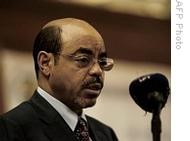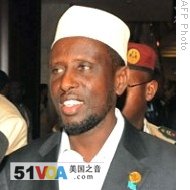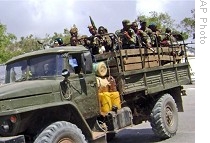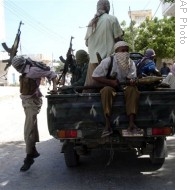Addis Ababa
14 February 2009
 |
| Ethiopian President Meles Zenawi, (file photo) |
Prime Minister Meles said he sees evidence of a major trend toward moderation in Somalia with the election of President Sheikh Sharif and his appointment of a western-educated prime minister. The Ethiopian leader told reporters the split between Sheikh Sharif and his former allies from the militant Islamist al-Shabab appears to be permanent.
 |
| The newly elected President of Somalia Sheikh Sharif Sheikh Ahmed, (file photo) |
Mr. Meles sent Ethiopian troops to Somalia in 2006 to drive out the Islamic Courts Union led by Sheikh Sharif and backed by al-Shabab. Even though al-Shabab is considered by many to be a terrorist group, Mr. Meles said he sees nothing to indicate the Muslim cleric might return to his former association with Islamic hardliners.
"We have no problem with him being an Islamist. So where is he going back to being an Islamists, he is already there. He always has been there. To being a terrorist, but we have no reason to believe he has ever been a terrorist. So what are we going to be afraid of as far as this person is concerned? We don't believe he'll change is colors, one way or the other. He was an Islamist; he is an Islamist. We do not believe he was a terrorist, have any information to prove that, and I don't believe he's likely to become a terrorist in the future," he said.
Mr. Meles said Ethiopia has no objection to Sheikh Sharif forming an Islamist government, if that's what Somalis want.
"Whatever a people choose by way of political system, whether it is democratic or non democratic is not our business. We are not evangelists of democracy. So if they want to govern themselves by means other than democracy, we have no problem," he said.
 |
| Ethiopian soldiers on truck during a farewell ceremony which took place at the presidential palace, Mogadishu, Somalia, 13 Jan. 2009 |
"Can Sheikh Sharif give me an assurance that Somalia would not revert to total chaos. No. Even if he wanted to, I wouldn't believe him because there are countervailing trends. The countervailing trends are the innumerable internecine conflicts among the various sub sub sub clans, and so far very few political forces have risen above these conflicts, and this has the potential of undermining any government in Somalia. So there are no guarantees in Somalia. All we can think of is a trend, and the trend is encouraging," he said.
Mr. Meles admitted Ethiopia paid a high price for its military intervention in Somalia, both in terms of lives lost, as well as its battered international image. Human rights groups accused Ethiopian soldiers of repeated war crimes, and critics claimed the presence of foreign troops had become a lightning rod for violence and a rallying point for extremist forces.
 |
| Al-Shabaab insurgents, seen, in a vehicle, in Mogadishu, Somalia (File) |
But even if that analysis proves wrong, the prime minister said he cannot imagine a scenario that would require him to send Ethiopian soldiers back to Somalia.. He told reporters, "as far as we are concerned, even the worst case scenario is not hell'.